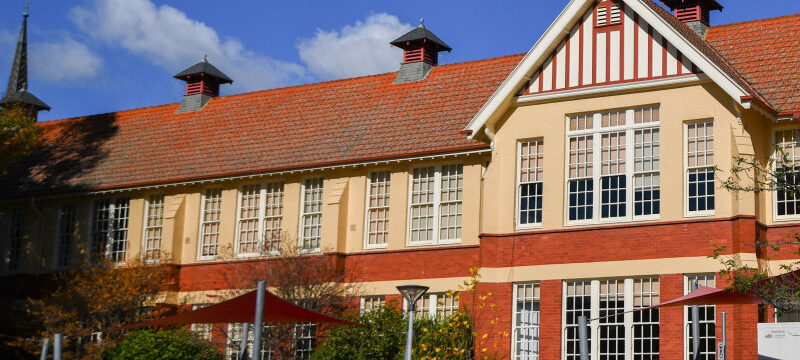Save articles for later
Add articles to your saved list and come back to them any time.
Eighteen more schools – including a specialist campus – are in line to be hit with the state’s controversial private school payroll tax by 2029, as those already on the list begin charging parents extra fees to cover it.
Parliamentary Budget Office (PBO) analysis of the policy has found three Catholic schools and 15 independents could be forced to pay the tax between 2024 and 2029 as their projected fees rise above the $15,000-per-student threshold.
De La Salle College is among school’s likely to pass the $15,000-income-per-student threshold before the private school payroll tax is reviewed in 2029.
Parents whose children attend schools already on the list are being slugged with additional charges, as schools attribute fee rises of up to 9.9 per cent directly to the payroll tax, warning that the rises will cover only six months of the tax in 2024. The following year’s fees are expected to increase even more sharply.
De La Salle College, Marcellin College, Alphington Grammar School and Ballarat Grammar are all named on the list of schools likely to cross the threshold in the near future.
The new list also includes Hawthorn’s Rossbourne School, a specialist college for 131 neurodiverse secondary students. It’s the second specialist school to be threatened with the tax, after the nearby Andale School was awarded an exemption in August.
The analysis, requested by opposition education spokeswoman Jess Wilson, used data from the Australian Curriculum and Reporting Authority (ACARA) to estimate each school’s income per student and pre-COVID growth patterns to predict future income.
It said schools close to the threshold could still choose to hold off increasing their fees and absorb additional costs to avoid losing their payroll tax exemptions.
The state government introduced the payroll tax with no warning in its 2023 budget. The tax was originally planned to contribute $420 million to the state’s COVID-19 debts, but will deliver about $100 million less after the government lifted the threshold from $7500 to $15,000 income per student in June. The PBO estimates the 18 extra schools will deliver $26.9 million to the state government over five years.
Sixty independent and Catholic schools were initially selected to pay the tax, but the government backflipped again in August, adjusting the rules so any school that crossed the threshold would be subject to the levy. The PBO said that decision was yet to be formalised in any document, and it was not yet known how many schools would pay the tax next year.
The PBO said it had sought but hadn’t received information from the Department of Education to prepare its report.
Instead, it used the similar but not identical ACARA measure for “fees, charges, and parent contributions” per student to assess whether schools were likely to exceed the threshold. It also used long-term growth patterns of about 4.2 per cent per year to project future income.
The PBO said it expected fees would continue to rise.
“By 2026, we project that average non-government school fees will grow to be 77 per cent higher than they were in 2010 and 23 per cent higher than they were in 2021,” the report said.
Rossbourne School principal Shane Kamsner said his students did not come from wealthy families and there was significant concern in the school community about possible fee rises.
Shane Kamsner, principal of Rossbourne School in Hawthorn.Credit: Simon Schluter
“If we were to pass on the payroll tax, it would be a significant increase in our fees,” he said. “Our parents would find it very, very difficult.
“I’d like the government to do its own due diligence and make sure that they understand the impact that they’re going to have on each school, rather than put each school into the same bucket.
“I understand that there are a number of very wealthy independent schools, but they are not the majority. The majority of independent schools are not big elite schools, they’re more middle of the road, and there are some struggling independent schools.”
Wilson said the revenue raised from the 18 additional schools would not pay two days of interest on Victoria’s budget debt.
“Victorian parents who work hard and make sacrifices to send their children to a school of their choice are being punished for the incompetence of the Labor government,” she said.
“This analysis confirms that Labor’s hit list is only set to grow and that hundreds of additional families a year will be forced to pay Labor’s tax on education.”
Wilson said if elected, a Coalition government would scrap the tax on schools.
Independent Schools Victoria chief executive Michelle Green said the PBO list included schools serving the needs of “hard-working aspirational families with no, or extremely limited, capacity to absorb it”.
“The only way to avoid the tax is to not increase fees, even by a modest amount,” she said. “This is impossible, given rising cost pressures and the need to main services for students.”
Green said broadening the tax net breached a written commitment non-government schools had been given at a meeting with Department of Education officials on July 27 that the list of schools liable for the tax would be held constant until January 1, 2029.
Catholic Education Commission of Victoria executive director Jim Miles said schools subject to the tax would need to cut learning programs or building plans, or increase fees at a time when cost of living pressures were already “biting hard”.
Get the day’s breaking news, entertainment ideas and a long read to enjoy. Sign up to receive our Evening Edition newsletter here.
Most Viewed in National
From our partners
Source: Read Full Article


